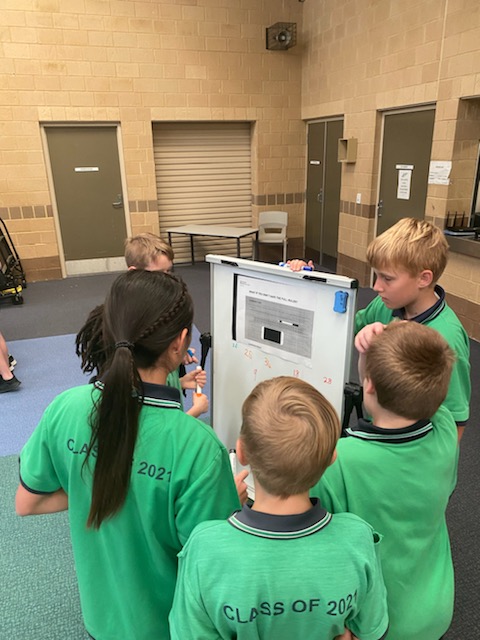Posted Tuesday, 20 May 2025
Scitech to spark science curiosity across the Kimberley
Scitech is embarking on an epic tour across the Kimberley, visiting 26 remote community schools.
Year 4 Teacher and curriculum coach Katrina Westwood shares her experience with the Alcoa Champions of Maths program.

Hi everyone,
My name is Katrina Westwood and I am a Year 4 teacher and curriculum coach at Makybe Rise Primary School. I would like to share my experience with being involved with the Alcoa Maths Champions program.
My initial interest in the program stemmed from my desire to extend my academically capable students by engaging them in challenging math tasks. I have a diverse group of students with emotional, behavioural and academic considerations. So, in our class, we focus a lot on working in collaborative groups in a respectful and productive manner. When we began the program, the children had been working in maximum groups of three. Moving to a heterogeneous, randomly sorted groups of four or five would have been a step into the unknown. As we progressed through the Alcoa Maths Champions program, I saw an increase in engagement from my students as they developed confidence in mathematics. And as a result, my hesitation around random heterogeneous groups changed and I began to see the benefits of using this methodology at a whole class level.
At the beginning of the program, to ensure all students felt they belonged and could be successful, we created a set of norms specifying how we would work and communicate with each other respectfully and inclusively. One of our goals was always a social goal and throughout the semester I explicitly taught, modelled and practiced active listening skills and the language we would be using. The children were familiar with the use of hand signals and ‘thumbs up’ to indicate agreement, so they quickly adapted to the ‘me too’ hand sign. We now use this across subject areas and in our morning meetings. Taking the time to explicitly teach and practise these skills was really important to the success of the lessons. At the end of each session, when the students were asked to share their understandings of mathematical concepts, I always asked them to reflect on the social norms by asking:
I also asked the students to use their fingers on their chest to give a 0–5 rating on how well their group worked together at the end of the lesson. And then the students shared the reasons for their scores.
As a facilitator of the post-task discussions, planning for and using different talk moves to navigate the discussion more purposefully resulted in students being more engaged and interactive in the process. My students needed to be shown how and what to share during these discussions. They needed a clear model of what an explanation sounds like and how they should respond to each other and to the questioning from both the teacher and their peers. We began to practice this, using sentence starters to promote thought and to tune students into the discussion. It was really nice to watch the growth in confidence across the class as they began to feel they had something worthwhile to contribute and they realised there are different ways to be good at mathematics. The highlight was when one of the lower ability students, who attends numeracy intervention classes, took ownership of his group’s work and was able to articulate their thinking to the rest of the class and respond to questions from the group.
After a few weeks, I identified the need for my students to see and hear what it looks like to collaborate using high-level mathematical language to extend their thinking and to explain their thinking and understanding in the discussion phase. I spoke to my colleague who has a Year 6 class, and we planned fortnightly lessons where both classes came together to problem solve in mixed groups. There were some very valuable learnings for both classes in these sessions. The Year 6s were challenged by having to explain their understanding. Sometimes they even had to adapt their explanations to either clarify or reconsider when they were shown an alternative by a younger student. The sessions challenged their social skills and ability to work respectfully with unfamiliar partners. We were surprised at how quickly the Year 4s developed confidence. In fact, they were often much more eager to participate compared to the Year 6s. I think the upright, non-permanent whiteboards had the greatest impact in these sessions. The students were all confident to contribute to the working out and also to discuss or explain their reasoning or strategies.
The coaching we received from Shyam and Lucas made me aware of the need to be explicit about the ‘mathematics’ within the tasks and the importance of prior reflection on what responses could be generated by students. I still find this aspect challenging but completing the task myself before presenting it to the class has made me mindful to prepare for all possibilities. Planning specifically for enabling and extending prompts and having them ready at hand has been something I have also taken on board. Previously, most of the discussions in my classroom have been open discussions where students share the range of possibilities or strategies they used. Through the professional readings and my involvement in the workshops with Shyam and Lucas, I began to plan the post-lesson discussions more purposefully. I now think more strategically about the purpose of the discussions and plan questions to generate a specific type of thinking and discussion that’s related to the mathematical goal of each lesson.
Along the way, I realized the importance of choosing the most appropriate task that’s linked to current or previously taught concepts. It took me two failed attempts until I finally achieved success, and that successful lesson was awesome!
 |
 |
My first two lessons were pitched too high, and I didn’t take enough time to set the students up for success. I was too focused on providing difficult problems for the higher achieving students instead of focusing on the process of collaborative problem-solving. The first lesson was “How many ways can you rename 1265?” (Sullivan & Lilburn, Open-Ended Maths Activities, p.33). Rather than renaming the number, most of the students partitioned the number in different ways. Upon reflection, next time I would begin this lesson with a hands-on activity using either MABs or popsticks and place value charts so that students can rename a four-digit number at their desks, and check for understanding of the concept before launching the problem-solving activity. During the post-task discussion, students were able to share their understanding of partitioning and compare random vs systematic strategies, but this was not the original Mathematical goal.
For the third lesson, I used “Four students have 15 counters between them. All students have a different number of counters. How many counters might each student have?” (Sharing Counters – CMT page 12)’. I planned a pre-task where the students worked on a similar problem using counters with their desk partners. This allowed me to gauge whether the students had a clear understanding of the mathematical task. We then moved into groups to work on the chosen task and the students all had a clear understanding of what they needed to do. This allowed for some great mathematical language and sharing of strategies. Allowing myself the time to set up the task was probably my biggest ‘ah-ha!’ moment so far.
My students love these sessions, and I had the opportunity to share the process with other teachers in the school. Some teachers even joined the observation lessons with Shyam and Lucas.
I am looking forward to consolidating my practice and expanding my repertoire over the next semester and watching my students’ confidence and competence in mathematics grow.
Would you like to continue a discussion on this topic with other educators? Join our Facebook group!
If you are interested in joining the Alcoa Maths Enrichment Program please fill out the enquiry form below and a Scitech representative will be in touch with you.
Upon clicking the "Book Now" or "Buy Gift Card" buttons a new window will open prompting contact information and payment details.